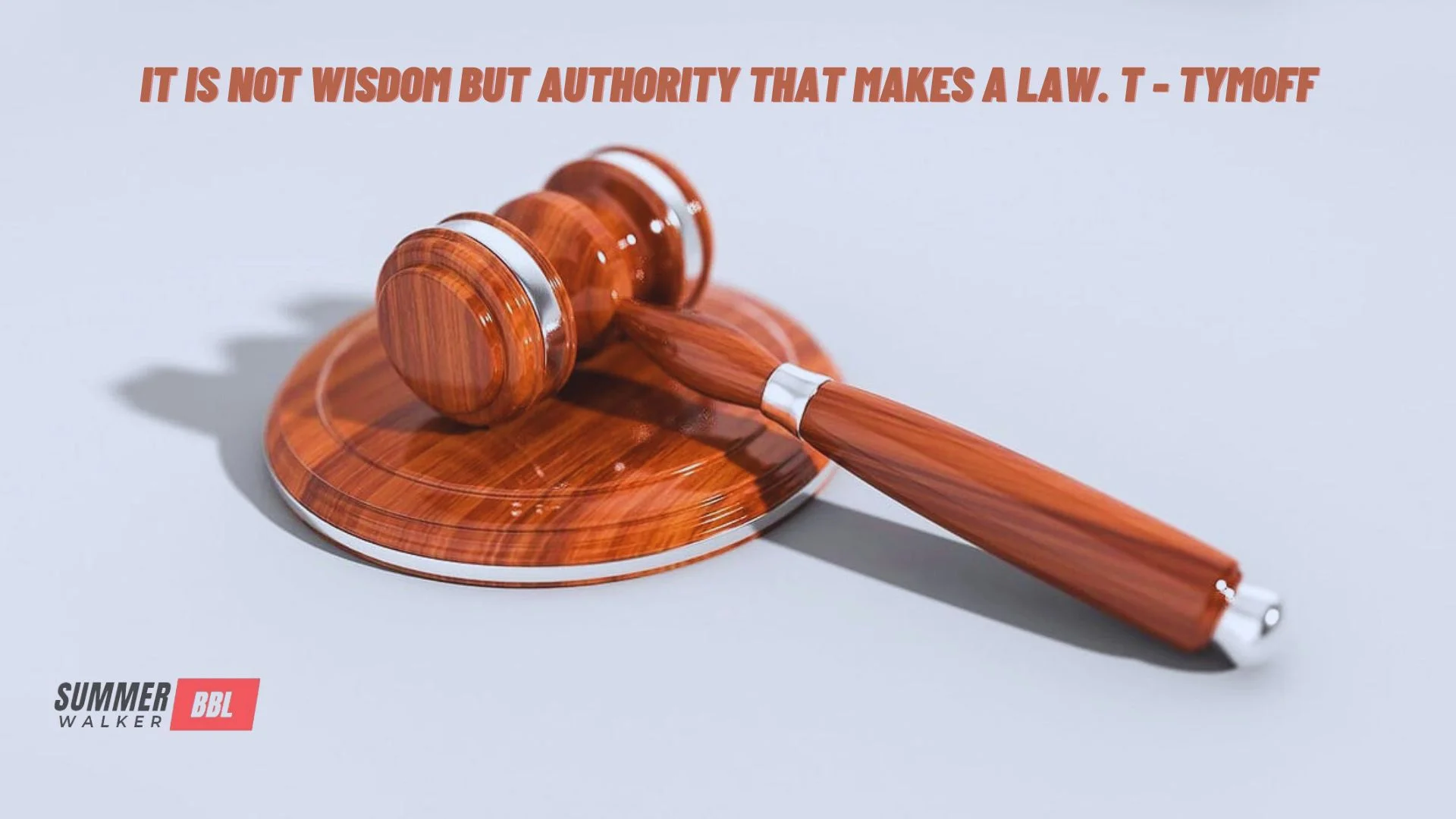“It is not wisdom but authority that makes a law.” This profound statement by T. Tymoff sets the stage for a critical examination of the foundational elements that constitute the law. In a world where legal frameworks are often revered as beacons of justice and reason, Tymoff’s assertion redirects our attention to the underlying forces of authority. By exploring this idea in the first part of our discussion, we aim to unravel the complex interplay between authority and wisdom in formulating laws.
Authority’s Dominance in Historical Law Formation
“It is not wisdom but authority that makes a law.” Reflecting on this assertion in historical contexts reveals how authority has shaped legal systems throughout centuries. This segment will explore various eras and civilizations, from the despotic rulers of ancient empires to the democratic governments of today, showcasing how authority, in its many forms, has been the primary architect behind legal enactments. This historical journey illustrates the persistence of authority in law-making and sets the premise for understanding its implications in contemporary legal systems.
The Philosophical Underpinnings: Authority vs. Wisdom

This section delves deeper into the philosophical debate between authority and wisdom, dissecting the concepts that distinguish these two forces. Authority is often linked with power, control, and sometimes coercion, while wisdom suggests a more enlightened, ethical, and communal approach to decision-making. By contrasting these attributes, we can better understand why laws often reflect the will of the powerful rather than the collective wisdom of the people they govern.
Authority in Modern Legal Systems
In modern societies, the role of authority remains as significant as ever in the law-making process. This part of the article will examine current legal systems across the globe, highlighting how governments, corporations, and influential entities continue to wield significant power over the creation and enforcement of laws. Through contemporary examples, readers will understand how authority shapes legal outcomes and often sidelines the wise counsel of the less powerful.
The Consequences of Authority-Driven Legislation
What happens when laws are crafted more by authority than by wisdom? This section will explore the real-world effects of authority-driven legislation on different segments of society. From restrictive laws that curtail freedoms to progressive laws that fail to consider long-term impacts, the analysis would cover a range of legislative outcomes. Here, the discussion would emphasize the need for a more balanced approach to law-making that incorporates authority and wisdom.
Advocating for Wisdom in Law-Making
More than ever, it is imperative to advocate for wisdom in the legislative process. This part of the article will critique current practices and propose methods for integrating wisdom into law-making. Suggestions include:
- Enhanced public consultations.
- The inclusion of expert advisory panels.
Mechanisms to ensure that laws are not only authoritative but also wise and just.
Conclusion
This section reiterates the core message of T. Tymoff’s statement, “It is not wisdom but authority that makes a law,” and calls for a paradigm shift towards more wisdom-oriented legal systems. By envisioning a future where laws are as wise as they are authoritative, we can create societies that are not only governed by the strong but also guided by the wise. This hopeful vision would serve as a call to action for policymakers, legal professionals, and citizens.
FAQs
What does the phrase “It is not wisdom but authority that makes a law” mean?
The phrase suggests that laws are often created not from wisdom or moral considerations but from the power and control exerted by those in authority. It implies that the creation of laws is more about who has the power to enforce rules than about the fairness or ethical soundness of those rules.
How does authority influence law-making?
Authority influences law-making by enabling those who hold power—whether political, economic, or social—to shape laws that reflect their interests and viewpoints. This can often lead to laws that serve the interests of a select group rather than the common good.
Can wisdom play a role in law-making?
Yes, wisdom can and should influence law-making. Laws grounded in wisdom tend to be more forward-thinking, fair, and just. They consider the long-term effects on society and strive to balance different interests equitably.
What are the consequences of laws made primarily by authority?
Laws made primarily by authority can lead to several adverse outcomes, including:
- Restriction of freedoms: Laws may be designed to suppress dissent or limit freedoms to maintain control.
- Social inequality: Laws might favor certain groups over others, leading to increased social divides.
- Short-sightedness: Authority-driven laws may focus on immediate gains rather than long-term societal benefits.
How can we incorporate more wisdom into law-making?
Incorporating more wisdom into law-making involves several strategies, such as:
- Public consultation: Engaging with the public to gather diverse perspectives and insights.
- Expert panels: Utilizing the knowledge of experts in various fields to inform legislative processes.
- Ethical considerations: Evaluating laws based on moral standards and the broader impact on society.
Why is it essential to balance authority and wisdom in law-making?
Balancing authority and wisdom is crucial because it helps create laws that are enforceable but also just and beneficial for society. This balance ensures that laws reflect both the practical aspects of governance and the ethical, moral, and philosophical principles that uphold societal values.
What are some historical examples where authority overshadowed wisdom in law-making?
Historical examples include:
- Authoritarian regimes: Where laws were used to consolidate power and suppress opposition.
- Colonial laws: Laws imposed by colonial powers that prioritized exploitation over the welfare of indigenous populations.
- Segregation laws: Laws that enforced racial segregation and inequality, reflecting the authority of the ruling class over the wisdom of equal rights.
By understanding these dynamics, we can better appreciate the complex relationship between authority and wisdom in shaping the laws that govern us.


